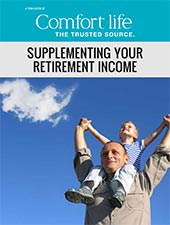Reverse Mortgage, Home Equity Line of Credit and Home Equity Loans: Which Is Right For You?
Retirement, it’s supposed to be when everything you've worked so hard for over the last thirty or forty years has finally paid off. Many picture themselves at a cozy cottage, hitting the links, beachside or traveling the world, all while feeling financially comfortable. That feeling of comfort is unique and particular to each individual and sometimes retirees find themselves in want or need of extra income. For those who own and have equity in their home, there are loan options: reverse mortgages, home equity lines of credit and home equity loans. Reported common uses for the borrowed funds can include: daily living expenses, renovating a home for aging in place, in home care, medical expenses, back taxes, pay off credit cards, travel, supplement monthly income, or purchasing a second home.
Reverse Mortgages: What are they and how do they work? A reverse mortgage is also known as a lifetime mortgage and is available to those individuals that are 55 years or older, including the spouse. There are no payments to be made while the property is still occupied by the homeowners. The requirements for approval are very simple: name, address, age and spouse's age if applicable, a brief description of the property and whether or not you have any outstanding loans secured against the property. They do not ask about income because no regular payments are required during the life of the reverse mortgage. A property appraisal is performed at your cost and then you are eligible to receive between ten and fifty percent of the appraised value of the home.
Lump sum or fixed monthly payments
The funds are either a lump sum or fixed monthly payments for life. You can use the money for whatever you wish with the following exception: if you have a conventional mortgage or home equity line of credit the proceeds from the reverse mortgage must pay those off first.
No interest
You don't have to pay any interest until repayment of the loan and it accrues on a semi-annual basis. Obviously, if you have a reverse mortgage for a long period of time, the interest charges will be quite high when you go to payout the mortgage. But, there are ways you can prevent having to pay a large amount of interest all at once. One option is to pay the interest charges annually. You're not required to do this, but certainly can do so if you choose. That way, the only amount you'll owe in the end is the principal.
Repayment of the loan isn't required until you sell your home, or it will be taken care of with your estate should you pass away before you sell your house. Even upon death of the homeowners the house doesn't have to be sold. If one of the family members takes over the home, they could take out a conventional mortgage to repay the reverse mortgage.
Pros
- Allows you stay in the home you love
- Reverse mortgages are very flexible when it comes to interest payments. You can pay one year, then skip the next, or whatever works best for you on a year-to-year basis.
- The lump sum payment or fixed monthly payments are tax free.
- One of the biggest advantages is generating tax-sheltered income. Reverse mortgage money can have several tax advantages if used properly. The interest that accrues on a reverse mortgage becomes tax deductible if the loan is used to invest. If you invest in something that pays dividends, you'll get the benefit of the dividend tax credit plus the deductibility of the mortgage interest.
- Another attractive benefit of a reverse mortgage is that the total of the loan can never exceed the fair market value of the home.
Cons
- It can create financial strain in the long run because it is almost too easy to use up the entire equity in your home, when combining the high interest rates of the reverse mortgage with the 50% maximum withdrawal
- With the principal and interest being repaid to the lender upon death, there is less left for estate purposes to leave to heirs.
- Unless you pay back the loan early, indebtedness can double every eight or nine years (depending on rates). Currently, the 5 year fixed term interest rate is 6.51% which is 3.5% higher than the best rate for a traditional 5 year fixed term mortgage with a major Canadian lender.
- The Canadian Home Income Plan (CHIP) is one of the only Canadian companies that offer a reverse mortgage at present time.
- If you sell your home within three years of taking out the reverse mortgage, you'll end up paying a penalty similar to that of conventional mortgage early payouts.
- With no visible loan payments, it's easy to forget how much is owing. If the loan was taken out to help make ends meet, seniors may be in for a shock when they need more money and can't get it.
Home Equity Line of Credit (HELOC): What are they and how do they work? In recent years, Home Equity Lines of Credit have also become a popular way for seniors to supplement retirement income. For seniors, this product would best suit someone looking to meet ongoing cash needs, such as medical expenses. A home equity line of credit is a pre-authorized credit line based on the value of the equity in your home. Generally, home equity lines of credit are available for up to 75% of the appraised value of the home. Generally the borrower is not advanced the entire sum up front and is allowed flexibility when drawing funds. The loan can be repaid according to your own terms, those being either principal and interest, or interest only. A HELOC may have a better image than the term “second mortgage”, but within the lending industry itself, that is exactly how it is categorized.
Pros
- Set up costs of a home equity line of credit are about one quarter of those for a reverse mortgage.
- They are available through most lenders and financial institutions.
- Currently they offer a significantly lower interest rate than a Reverse Mortgage and are usually based on the current prime rate (see cons for the downside of being based on prime rate).
- No age requirements.
- Legal fees are often the only closing costs required.
Cons
- Often there is a condition that the borrower must maintain a certain level of equity in the home, which is usually not a concern. However, if real estate prices take a tumble a home can become worth less than the mortgage and the home equity line of credit owed upon it and therefore the homeowner could be at risk of losing the property to cover the loans.
- If unable to meet obligatory regular payments you may be forced to sell your home to pay the debt.
- You must make regular payments, although the borrower can choose whether it will be interest only or a combination of interest and principal.
- The lender may sometimes require a minimum income level which for some retirees would mean they would not qualify.
- Not all lenders calculate the difference between the prime rate and the interest rate the borrower will actually pay, so do research this up front.
- Often there is no adjustment cap which means that there is no protection if the prime interest rate does increase.
Home Equity Loans (Closed Ended): What are they and how do they work?
The most common type of equity loan is the Home Equity Loan (HEL). A HEL is secured by the home you own as collateral. For example if you own a house worth $500,000 and you have 20% ($100,000) equity in the house, you can apply for a HEL and use the 20% you actually own as a security for the loan. Getting a Home Equity Loan, effectively decreases the equity you have in your house and places a lien against the property, that's why the HELs are also known as a second mortgage. Unlike a HELOC, with the Home Equity Loan (Closed Ended) the borrower receives the entire amount of the loan upfront. This type of product is best suited for someone who has a very specific reason for borrowing, and knows in advance precisely how much they need. A good example for the use of a Home Equity Loan would be a home renovation that would allow a senior to age in place.
Pros
- You can get a Home Equity Loan from almost any major Canadian financial institution.
- The Home Equity Loan market has become very competitive, so rates can be low.
- The fees associated with them like closing fees, appraisal fees, legal fees can be lumped into the loan itself.
- Can choose either a fixed or variable rate.
Cons
- Like a HELOC, failure to make the regular required payments will put you at risk of losing your home.
- Must make regular predetermined principal and interest payments.
Conclusion
In conclusion, borrowing against your home’s equity can be good for some individuals, and detrimental for others. Think carefully about what the funds are needed for, how much is needed and for how long. None of these products are too good to be true; all are loans that eventually need to be repaid. If you are considering a Reverse Mortgage, Home Equity Line of Credit or Home Equity Loan you should have a financial advisor who is knowledgeable and understands what your goals are, a tax professional, a mortgage broker and perhaps speak with other family members about it as applicable to your situation.
If one of the main reasons for borrowing is that the home is too costly to maintain for your current income level, another option to consider instead of borrowing or refinancing, is selling the home to provide you with the cash proceeds. This money can be used to buy or rent a less costly home or live in an active adult community and the rest placed into conservative income producing investments.
It is important to look into a variety of options before settling on borrowing or refinancing as the right solution for you.
Sherri Moro, B.A., ABR*, SRES**, is an annually award winning Halton area REALTOR® with Sutton Group Quantum Realty Inc., Brokerage. For over ten years, her very successful consultative approach and innovative strategies have provided preferential client service in both the marketing and purchase of Halton area residential properties. Sherri is also a licensed Mortgage Agent with RBL Capital Inc. #10583 and can assist you with all your borrowing and refinancing needs. Visit her at www.OakvilleDreamHomes.com . *Accredited Buyer Representative, **Specially Designated to Serve the 50+ Market.


